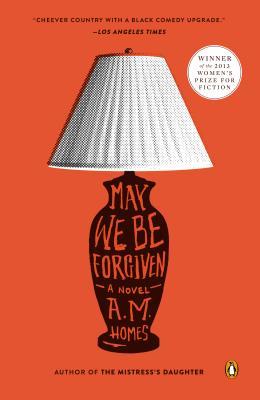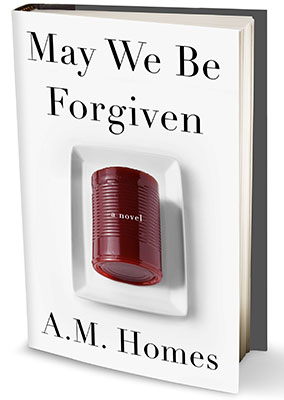Book Review: May We Be Forgiven by A. M. Homes (Penguin Books; 496 pages; $16).
 If your family is anything like the Silvers in A.M. Homes’ black comedy May We Be Forgiven, you’re glad the holidays are over. Homes is fierce and fearless in her depiction of a Twenty-First century family in crisis. She knows just how to blend satire with realism, just how to mix tragedy with comedy, and just how to make her pages sizzle.
If your family is anything like the Silvers in A.M. Homes’ black comedy May We Be Forgiven, you’re glad the holidays are over. Homes is fierce and fearless in her depiction of a Twenty-First century family in crisis. She knows just how to blend satire with realism, just how to mix tragedy with comedy, and just how to make her pages sizzle.
Homes’ characters are deeply flawed people, yet they are nothing but real. Harold Silver, the novel’s main character, cannot help but be jealous of his little brother, George. While Harold is a Richard Nixon scholar and historian, his brother is a powerful and wealthy television executive with a beautiful wife, two children, and a gorgeous home. What Harold doesn’t envy about George is his violent temper.
The dominoes fall one by one when George gets into a car accident, killing a mother and father and injuring and orphaning their young son. If that were not enough for one week, George snaps when he comes home to find his wife in bed with Harold. He grabs the bedside lamp and hits her over the head with it. These are not spoilers. They happen within the novel’s first fifteen pages.
The story is not about these events anyway: rather, May We Be Forgiven is about how Harold seeks atonement for his part in the tragedy. He blames himself. If he had not been having an affair with his sister-in-law, then perhaps he could have averted catastrophe. Harold becomes the guardian of his brother’s children, Nate and Ashley. He also feels responsible for the orphaned boy. As Harold assumes a new life so different from the one he had before, he seeks absolution.
Although Homes’ characters are completely unlikeable and unrelatable, they are strangely fascinating. Harold is Homes’ most well-developed character. When he is asked to edit a series of fictional stories written by Nixon, Harold jumps at this opportunity. He sees Nixon as a father figure. As Harold tries to atone for his own misdeeds, he seeks to assuage history’s view of the president. It makes for compelling reading.
In fact, I challenge you to stop reading this story. Once you start, you cannot stop. Homes’ pacing is quick. Her punches are like those of a boxer’s. Surprises permeate on every page.
Sometimes, though, it is just too much. It is as if Homes tries to one-up herself on every page, producing an over-abundance of shocking scenes with little or no segue between them. Reading Homes’ novel can be like running a marathon, leaving you gasping for breath. Homes, in certain instances, goes too far, most notably when Harold instructs his niece on how to use a tampon. Shock value is a tool that should not be overused, even when writing a black comedy. A little can go a long way.
Homes is unapologetically irreverent in May We Be Forgiven. That’s why this is not a book for everyone. If you enjoy dark comedies, you will love this story. If you are not a fan of black comedy, stay far away.
I reviewed this novel last year and it’s now available in paperback. I absolutely love the new cover!




